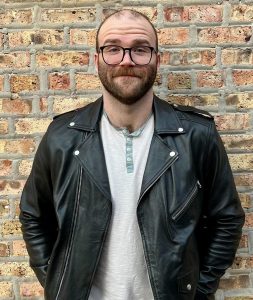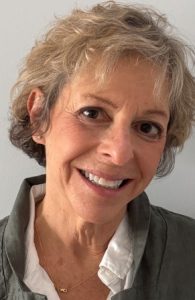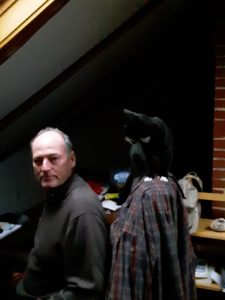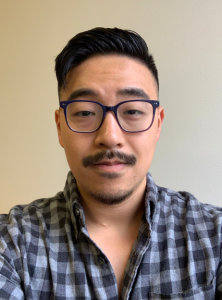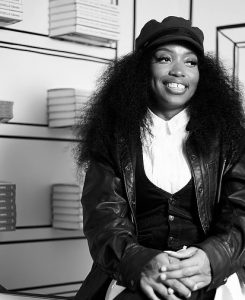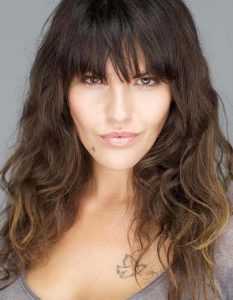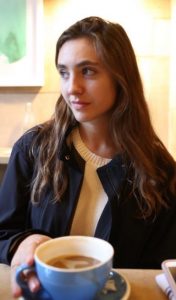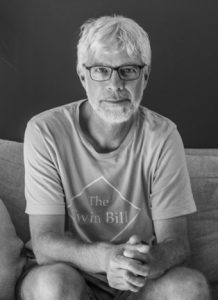
“Rattlesnake trainer?”
“No, dog trainer. I’ll train dogs to avoid rattlesnakes.”
“What? That can’t be a thing.”
“It is.”
“No way.”
“I’m not a liar.”
“I never called you a liar.”
“It beats selling crypto.”
“Hey, that keeps the roof over your head.”
I hang up before my brother can say anymore. And before I tell him to fuck off. And before I tear up. I turn up the car radio–it’s my brother’s car-and wish I could not think about how in the last year I’d been a waitress, call center representative, substitute church custodian, and apprentice chimney sweep. Now this. I didn’t lie when I said I wasn’t afraid of snakes. I didn’t have to lie when they didn’t ask me about my mental health.
The first dog, Elli, is small-medium gray mutt. I put the shock collar on then lead her to the ring. The ring is made from a one-foot-high plastic fence which I stake into the ground. It’s about twelve feet in diameter and one foot high. Enough to keep snakes in. The snake box is on the far side. Four baby rattlers all with muzzles. We use babies because they’re the most dangerous, they can’t control their venom. We feed them ground turkey with some sleeping powder stuff. When they crash, we put on the muzzles then drop them in the box. I imagine they wake up mad. I bring Elli into the ring and unleash her. She sniffs and pees on the dirt. I walk over to the box. I hear them moving. I open the door. Nothing happens. Then one comes out. Then two. Elli comes over, nuzzles my knee, not even looking at the four snakes just a few feet away. One sidewinds like crazy. Elli turns towards it. I grip the remote tight, ready to shock her if she moves in their direction. She doesn’t. That snake lunges at another. It rattles. Elli walks away. She could care less. I’m not sure what to do. My throat tightens. I also can’t remember how we get the muzzles off the snakes but that comes later.
My brother is dozing in his lounger when I get home. It’s dusk but I can see the dark circles under his eyes. I get a beer from the fridge and sit near him on the couch. I put the can in the crook of one arm and try to open it with my unbandaged hand. It spills and drops to the floor. “Shit.” My brother opens his eyes and spots the bandage right away.
“Oh god, did you get the serum?” he says.
“What?”
“Serum, anti-venom.”
I want to laugh. “It was the last dog,” I say. “I shocked him and he bit me. No big deal.”
I feel his warm hand on my forearm. “Really”
“I don’t lie,” I say.
I close my eyes and hear him exhale. “I know,” he says. “Did you like it?”
I hear the sound of the snakes moving through the dirt, something between a broom and the tide. “Yes,” I say, eyes still shut.
“Good.” He squeezes my arm. “Let’s celebrate. I’ll get you another beer.”
I open my eyes, watch him move slowly toward the kitchen, and think just maybe.
I work Tuesdays, Thursdays, and Saturdays for High Country Kennels. We board dogs, run various canine behavior clinics, and hold “Rattlesnake Aversion Training” most weekends. We’re a small outfit, three employees, and the owner, Robert. After my third rattlesnake session, Robert holds a longneck beer and watches as I remove the snake muzzles and put them back in their enclosures. “You know,” he says between pulls on the bottle, “you’re a natural. I’ve never had someone take to the snakes so quickly. You have a future here.” Compliments are hard for me so I look away, needlessly triple checking that I’ve secured the latch.
“Thank you,” I say without facing him. “I like animals. I almost got a job at the Humane Society a while back.”
He snorts. “Bunch of motherfuckers over there, they almost ruined me. Corrupt bastards, lucky you didn’t land with them.”
I turn to see him finish the last half of his beer in one swallow, eyes hard. He walks silently to his office. I grab a rake to smooth over the training area.
At home, I tell my brother about Robert’s reaction. He doesn’t look up from his laptop and I fix myself a bean and cheese burrito. “Did you finish the jalapenos?” I call out.
“Found it,” he says.
“What? I don’t see them.”
“2017. Lawsuit in county court. The Humane Society sued him and he countersued.”
“What are you talking about?” I give up on the jalapenos, roll the tortilla, and put it in the toaster oven. My brother makes his in the microwave.
“Your boss had a legal battle with the Humane Society. They sued him for cruelty to animals, both snakes and dogs. He countersued for defamation. It doesn’t look like anybody won but must cost him a pretty penny in legal fees. All public records if you know where to look.”
And my brother does. He dropped out of law school after one year. His reason for mostly not talking to our parents.
“The shocks aren’t so bad,” I say. “I got one – fuck!” I look at the singe on my fingertip where it touched the toaster oven coil.
“Yeah, but you knew what was coming, you got to prepare for it. The dogs have no idea. And as for the snakes …”
I turn off the cold water and look in his direction. He’s still immersed in his laptop. “How do you know all this?” I say.
“Google.”
“When?”
“Right after you got the job.”
“Why didn’t you tell me then?”
“You were excited about the job.”
I was. I am. I bite my burrito. It’s bland with no jalapenos. I think about throwing at my brother.
Tuesdays are slow at the kennel and mostly dog free. We get lots of weekend bookings which can extend to Monday so I clean stalls for most of the day with the other woman who works here, Araceli. She’s shy like me and I hear the sounds of her hosing down and scrubbing adjacent stalls with no conversation between us when we cross paths. Robert is very fastidious about the cleaning process so it takes more time than one might think. We have four dogs here today and they each need to be walked. On a light day like today, we can walk them a half mile down the county road to a small park where they can run off leash if the owners have signed the consent form. This service Robert sees as premium and involves a surcharge.
By our 10 am break, Robert is still not here which is a first for me. I only got in because Araceli has a key. She’s been here longer than me so has earned that trust, I guess. I want to ask her if she knows about the lawsuit but most people don’t search for six-year-old county court cases.
We take the four dogs to the park and watch them romp around. We’re alone except for a man who sits on a bench at the park’s far side. I can’t tell his age but he appears to be smoking. Without prompt, Araceli tells me she will be gone next week. Her brother is getting married and she will be traveling to Mexico, Oaxaca State, for the wedding and festivities. She doesn’t appear too excited and I don’t want to pry so I just say, “That’s nice. Will the weather be good?” She tells me nights are cold this time of year but the days should be okay. Suddenly, I want to ask her many things like how long she’s worked at the kennel, whether or not this trip is paid vacation, and what she thinks of Robert. Instead, I say, “Do you like your future sister-in-law?”
She squints as if she doesn’t understand the question before saying. “No, I hate her.” I turn my head and she explains that the woman was in her grade at school and never talked to her. She considered her family to be of a higher status than Araceli’s. Now that Araceli’s brother has made good money selling cell phone service, she’s okay with their family. “She a fucking snob and mean.” I’ve never heard Araceli swear or talk so much and I’ve completely forgotten about the dogs, but some barking then shouting brings me back. The man is now half the distance from us and is yelling at Logan, a small-medium, mostly white pit mix with a tan star-shaped mark on his forehead. He’s sweet but excitable and jumps around the man’s legs. Araceli and I run toward them.
“Get your damn dog away from me!” The man looks about forty, receding hairline, skinny, and red-faced. His accent is British.
“Sorry sir, he’s harmless, just high energy. Logan, come.” I yell.
“These dogs are not harmless; they should be eliminated like we did at home.”
I remember hearing something about Britain killing all pit bulls. I call Logan again and he looks at me but then turns and jumps toward the man’s leg. He’s not very well trained. The man kicks him squarely in the ribs, hard. Logan gives an awful squeal and rolls on his side just as I reach him. Araceli is a step ahead of me and before I crouch to tend to Logan, I see her rush the man and slap him across the face. “Aiieee” he yells. She must have hurt him. I freeze, having no idea what to do. Logan yelps. Araceli stands directly in front of the man, her face red, a rivulet of sweat across her cheek. The man raises his hand. My throat catches and he takes a step back. The slapped side of his face shows her handprint. “Fucking bitch,” he yells, spit flying with the expletive. Then he walks off.
I drop to the ground in front of Logan. My legs are twitching and my shirt is soaked. He’s still on his side but quiet and not breathing too hard. I offer him my hand and he licks it, which I hope is a good sign. I feel the heat radiate from Araceli’s body as she puts her hand on Logan’s side. She strokes him gently, her fingers probing his fur. He responds by sitting up and poking her hand with his nose. “I think he’s fine,” she says. “Nothing feels broken. Maybe you should get the other dogs.”
Shit. I’ve completely forgotten about them. There’s so much I want to ask her again, but I say nothing and get up to find our other charges.
We walk back to work without talking about the man as if our silence will erase the whole experience. Araceli tells me that she was studying to be a vet tech so she’s examined many injured dogs. She stopped the program when she got into some debt due to a car accident so now, she has three jobs instead but hopes to go back. I feel guilty thinking about how I only have one part time job thanks to my brother. Just before we get back to the kennel, her phone buzzes. “Robert,” she says.
“Were we out too long?” I ask. I can’t lose this job.
“No, he’s not coming in today, we’re on our own.”
The rest of the day passes normally, the incident at the park unmentioned. I don’t ask about Robert’s absence or how often he messages her or if she’s ever slapped someone before. At the end of the day, we make sure the dogs have adequate food, water, and outdoor access. They’ll be alone twelve hours which seems like a lot but what do I know about kennels. There are no rattlesnakes here, Roberts keeps them somewhere else and brings them to our workshops in the wooden box. We leave together and Araceli locks the door. “That was quite a day,” I say.
“Yes.” She has bags under her eyes.
“See you Thursday?”
She nods and walks to her car. My brother’s message comes in as I start the car.
Heading out for a drink with Raj. Thai on the counter. Check this out.
Raj is his best friend and Thai is my favorite food. He’s sent me a link: “The Proficient Pup”. It opens to a page which says “Stop Worrying About Snakes and Start Enjoying Nature Again”. I scroll down and see a note. “We do not use live snakes or shock training.” I curse my brother and X out of the site, knowing I’ll come back to it.
I mostly stopped talking to my parents after my father told me to “Suck It Up” when I told them college made me too sad toward the end of freshman year. I can’t say exactly why it made me sad. I liked some classes, disliked others, had a few friends, one relationship. Maybe it was all my parents’ friends who said “You must be having the time of your life.” Or the rows of students in the Psychology 101 lecture, everyone looking at their phones as if their devices, not Jung or Piaget, held the secret to life. Or the endless talk about sorority and fraternity rushing. Or the fetishization of football. My father said I should never have chosen the large state university with my fragile mental state and that I could still transfer to a small liberal arts college with no Greek life or football if my grades were good enough which they weren’t. I told him to fuck off in my head and stopped calling, then moved in with my brother after the year ended, a second college dropout in the family.
Now we don’t call and we see our parents, who live less than two hours away, but twice a year, Christmas and their Labor Day party, a tradition they love for reasons neither my brother nor I can understand.
My brother picked my favorite Thai dish, yellow curry with tofu and vegetables, and I eat half of it before I open up the site he sent me. They advertise a “progressive” training method with no shocks or live snakes. I find an attached infographic which detailed the reasons why this method was preferable to and more humane than the old one. The woman who runs the training has a graduate degree, used to work at the zoo, and also does canine massage therapy. I feel warm, shameful, dirty even. And I remember Robert’s anger at the mention of the Humane Society which now seems like defensiveness. I’d have to face him on Thursday. And what if Araceli was wrong, what if Logan wasn’t okay? Would we confess what happened? I put the last piece of curry-soaked zucchini down. My head is starting to hurt. I spot the phone number at the bottom of the Proficient Pup site.
My last job was as an apprentice chimney sweep for a one-woman business, owned by Margaret, a retired Navy captain. Now she spent her time on roofs. I told her I wasn’t afraid of heights or getting dirty. She offered me a position on the spot, said she’d like to find someone to take over when she decided she was too old. On the first day, I watched her complete two jobs. Day two she said I could help. The first house was owned by older couple, it had small rooms with pictures on every surface, grandkids, vacations, and the like. They had a woodstove in the living room and I cleaned from inside while Margaret worked from the roof. Since it was summertime, the house was warm and the woman offered me iced tea. I worked slowly but Margaret said I did a good job.
The second house that day, Margaret described as “crazy”. It was a large modern home which looked like it had been built with connecting Lego cubes, stacked without much rhyme or reason. There were three fireplaces; we were to clean two of them the family claimed to use, though Margaret suspected they hardly used them at all from how clean they were the year before. A teenager answered the door, shirtless, a scrawny muscular type with pale skin. He nodded at Margaret but gave me a long up and down look as if I were not covered by my dirty shirt and jeans. On the first chimney which was the highest, we followed the same procedure as before. While I cleaned the fireplace inside, I could hear loud rap music coming from one of the upstairs cubes. After inspecting and complimenting my work, Margaret asked if I’d like to reverse roles on the second one. This chimney was much lower, on top of one of the cubes next to a higher stacked part of the house. Near the chimney was a large sliding door covered by blinds which had to lead into the second floor of the house. With a flat roof, the work was easy. I liked the soreness in my arms as I worked the long brush. I could tell there was very little soot to remove, but kept at it, wanting to impress Margaret with my work ethic. The roof was hot and I stopped for a drink from my water bottle giving the neighborhood a look around. The lots were big with expansive lawns and pine trees separating the houses, a mix of older and more modern, though none as unusual as this one. I turned back toward the house. The blinds had been opened on the sliding door. The teenager stood at the window, fully naked, one hand furiously stroking his erect penis, a shit eating grin on his face. Bile rose in my throat and I made a sound between a scream and a retch. I grabbed the brush and scrambled down the ladder. Margaret met me at the bottom with a questioning look–she’d obviously heard my noise. I was shaking.
In her truck, my fingers gripping the armrest tight, I told her.
“Prick,” she said, keeping her eyes on the road. I waited for her to say more, but she didn’t.
I couldn’t leave it there. “Isn’t that like some form of sexual harassment, couldn’t we–” I stopped short at her snort.
“Little fucker,” she said, “probably going to join the Navy. You know how often I saw that kind of shit?”
“Yeah, but does that make it okay?” I felt my tone rise.
“You think you have a case here?” Now her tone rose and she glanced in my direction as she changed lanes. “He was in his own house. How many times a day do you think he jerks off?”
I didn’t have an answer for that. “Look,” she said, “what happened wasn’t good, and I hope never happens again, but you see some weird shit in people’s houses. I can tell you’re upset but I have to know that this is the right fit for you. I can’t have someone jittery on roofs.”
“I’m not jittery,” I said much too loud.
“You are.” The Navy captain’s voice. We rode in silence. When she dropped me off near the bus stop, she said she had no jobs for the next few days but she’d call me.
She didn’t.
The work day Thursday starts normal. Robert is at his desk when I get in at 9. He gives me a nod, no indication of his poor mood the last time I saw him. Araceli shows up at noon, also giving me a nod as if the events of Tuesday never happened. Jorge is in today. He’s quiet and does accounting or something else computer based for Robert. We’ve never said more than hello. Today I have four stalls to clean–I notice Logan went home–and then shorter walks with the five dogs that are here.
By two o’clock, I’ve finished my work along with two check-ins. On Thursdays I’m scheduled until 4, but Robert often tells me to go home early if there’s little to do. Araceli is out back in what I think of as the rattlesnake pit, giving a one-on-one dog training lesson. Today her client is a young man with a rambunctious boxer. Araceli patiently explains to him that he’s the master and gives him techniques on how to cue the dog for certain behaviors and reinforcements when the dog gets it right. I watch her, sitting on a shaded bench, the hot sun feeling good on my ankles. I think about how she should be a vet tech or even a vet. She’s leading the dog through heeling when Robert calls my name.
“Be ready for a clinic Saturday,” he says when I turn toward him.
“Oh. I didn’t see one on the schedule.”
“It’s not. This one is strictly for a few of my friends. They hike a lot in the backcountry with their dogs. I want to give them the experience without the crowds.”
Crowds? We cap our rattlesnake trainings at 10. “Okay,” I say. “You want me to lead it?”
“Of course,” he says. “Bring your A game. And feel free to go if you’ve completed your work today.” Then he goes back inside.
I feel dizziness as if I’d stood up too quickly. What does any of this news mean? I look back toward Araceli who’s watching the man trying to get his dog to heel. Even I can see he’s doing it all wrong. Her face belies no frustration as she again shows him proper form and posture. I want to grab her and ask more of my questions but I can’t interrupt so I go home instead.
My brother and I watch a movie that night. I try to get him to go out and see Barbie with me but he says he’s tired. He chooses a movie about two Syrian girls whose dad is training them to be competitive swimmers. When the political trouble starts, they’re forced to leave the country and become refugees. It’s beautiful, based on a true story, and so sad. I cry quietly through the last twenty minutes hoping my brother won’t see.
“You never cry at movies,” he says. The credits are running and he stands, popcorn bowl in hand.
“Work has been weird,” I say, not looking at him, not wanting to see his reaction at one more possible failure.
I hear him take a step toward me and I look up. He leans down and kisses the top of my head. I let out something between a cry a snort and a laugh and a plume of mucus-y snot lands on my jeans. He laughs. I laugh and this time spit flies from my mouth falling exactly on the mucus spot. “Gross,” he says, but I can see his wide smile, “and goodnight.”
Friday is a slow day. My brother decides to work from a coffee shop so I clean the apartment. As a scrub the bathroom, I remember that Araceli is traveling to Mexico today. She won’t be at work tomorrow when Robert’s friends show up. I turn the music up, hoping to push this thought from my mind. With the apartment done, I set out to walk the mile to the grocery store to buy the fixings for enchiladas, my brother’s favorite. Walking there, I decide to make the green sauce though I know the one I buy in the can is perfectly acceptable. I open a browser for a recipe and “The Proficient Pup” website stares back at me. I call.
“This is Katy.” The owner with the advanced degree and zoo experience.
“Hi. I was hoping I could ask you a few questions.”
“About your dog?”
I explain who I am, that I love dogs, and where I work though I don’t name our kennel or Robert. Before I say I want to learn more about her approach, she interrupts.
“Shock training is cruel. It’s unethical.”
“But I got shocked, it didn’t really –”
“Bullshit.” I don’t have an answer for that. “Look, I gotta go,” she says. “I suggest you read through my website. Bye.”
I had read over her website. And I need my job. And it could save a dog’s life. Or at least that what our website says. Enchiladas, I need to focus on enchiladas.
Robert’s truck is there when I get to work Saturday morning at eight. “Morning,” he says loud when I come in. “Donut?” I see a pink box on the table. This is a first. I say no thanks and start to set up, his friends are coming at nine. I take out the fencing and the stakes, trying not to think about yesterday’s phone conversation.
The friends are two men. Standing with Robert, the three of them could be triplets, each tall and lean with salt and pepper hair. Robert introduces them as Greg and Cork, not saying if the latter is a nickname. Greg’s dog is a yellow shepherd lab mix, a strong male dog with a beautiful flaxen coat. Cork’s dog is a female German short-haired pointer. Both dogs are young with plenty of energy which I knew could make for a challenging session.
The men stand on the patio under the shade umbrella. The dogs run along the outer back fence. Robert brings out a thermos and three red cups which he fills. “Bloody Mary?” he calls to me as I make sure the training circle is perfect. My hands shake a bit as I recheck the stakes. I mouth “No thanks” in his direction.
“So, what about those snakes,” someone, Greg I think, says too loud.
Robert laughs. “Okay, okay, let a man finish this drink.” The trio is into the second thermos. I stand sweating in the shade of the lone tree, a desiccated palm, the dogs sprawl near me, having quickly expended their energy. Robert takes a long gulp from his cup, then sets it too close to the table’s edge causing it to drop to the ground. I see the last of the red liquid ooze from the cup into the dirt. It looks like congealed blood.
Robert sways a bit as he carries the box of snakes into the ring. He puts it in the center of the ring, which is not normal, while I get the shock collar on the lab mix who we’ve decided will go first. Robert opens the door to the box and gives it a kick, also not normal. “Here we go,” he says, his voice a bit shrill, face red.
“Shit, we got some live ones,” Greg yells.
I walk the unnamed dog, they didn’t tell me and, after spending twenty minutes watching them, I’m too embarrassed to ask, toward the two snakes which have come out. The lab takes an immediate interest and tugs in their direction. He’s strong. I release the spring-loaded leash a bit and grip the shock remote tightly in the other hand. Yesterday’s phone call comes roaring back. He reaches the end of the leash and pulls again. My feet are well planted but it still takes much of my counterweight to hold him back. I let out another two feet of leash and he moves forward. There are now three snakes out and all rattle. “Fuck,” one of the men says and I shake just a bit. concentrating on the timing, trying to push Katy’s words from my head. Two more steps and I push the button. The dog yelps and jumps back. He recovers and takes a small step toward the snakes who are synchronously spinning and rattling. I shock him again. Again, he yelps but this time when he gets his bearings, he shirks away from them. I try to edge him in their direction but he pulls away. Success. Maybe this is fine. It could save his life one day. I look back at the men. Their glasses are raised. Robert is now drinking out of a blue cup. Cork holds his pointer who seems a bit agitated by what has gone on the ring.
The pointer is Olive. She’s much lighter than the lab mix but squirmier when I attach her collar. The snakes are now across the ring up against the plastic fencing which has holes but far too small for them to get through. Olive leads me in their direction. Despite her bounciness, I feel steadier. Approach, rattle, shock. A couple of times and we’ll be done. When she gets within two feet, I hit the remote. Her scream shreds the air and I feel the breakfast cereal in my gut seize. That isn’t a sound a dog should make. Shock training is cruel. She jumps backward and her toenail digs into the gap between my jeans and the tongue of my sneaker. She yelps – this time normal – as she gets her footing and I resist the urge to hug her and instead pull her back, sticking to protocol. The men are quiet. Cork looks concerned.
A bead of sweat drips toward my eye but I don’t have a free hand to do anything about it. I take a step back thinking this might be a one and done, for some dogs it is. But Olive perks up and pulls toward the snakes who are continuing to explore ways to escape the fencing. The sweat stings my eye. I let her lead and she keeps on. Again, at a two-foot distance, I shock her. The scream is less but still a scream. “Damn,” I hear Cork say after Olive straightens up.
“Some of them are stubborn,” Robert says. Once again, Olive pulls me toward the snakes. When I shock her the third time, she lets out a whimper as her whole body shudders and she collapses to the ground. I immediately drop to the ground and Robert yells my name. I don’t touch Olive and she gets up. It was a small shock, she has to be alright. I’ve gotten one. This time she stands still, eying the snakes but not moving in their direction. Then she takes a tentative step their way. I hold firm and do not let any more leash out. She pulls. “Let her go,” Robert yells. I look in the men’s direction. Robert’s face is red, Greg’s eating a donut, and Cork looks confused. “One more time,” Robert says, “that should do it.”
“No.” I say.
He takes a few steps forward, almost to the fence. “Do it. One more time. She’s stubborn.”
“No.” He steps over the fence into the ring.
“Robert-” Cork says.
“I got this.” Robert holds out his arm to dismiss Cork. Then he glares at me. “Give me the dog.”
I think about Araceli slapping the man. I think about Syrian girls swimming to sanctuary. And Katy’s words. I shake my head.
He takes another step forward. “I’m not asking you again, give me the fucking dog.”
I take a step forward and hand him Olive. Then I step around him and over the snake fence. I half jog to the big fence which encloses our yard and hurl the remote over. On the other side is an undeveloped scrubby lot, it’ll be hard to find. And it’s our only one. Robert always stresses to be careful with it as he hasn’t gotten around to getting another one. Then I run. Past the men and into our office. “Fucking bitch!” Robert screams. I tear through the front door without looking back.
I stop running about five minutes later. I’d looked behind me a few times. No one. I’m off the county road and bus line and in an unfamiliar neighborhood with small, well-kept houses. At a shaded intersection, someone has placed a bench near what looks to be a path leading into a small canyon. I sit. My face burns but there’s also an unusual calmness, the normal wave of anxiety isn’t there. I’ve lost another job to be sure. But it’s a job I should have lost. I sit letting my body cool. I left my water bottle at the kennel.
After a while I pull out my phone to call my brother. There’s a text message.
Hi. You called me yesterday to ask about shock training and I didn’t catch your name. I stand by what I said–it’s cruel and not ethical–but I’m sorry if I was harsh. It was a tough day, one of my employees just quit on me. Come by and I could show you our training methods. If you are as passionate about dogs as you say, maybe we could discuss some hours here it’s a good fit. Katy.
I read the message three times. It’s real. I call my brother.
I have job news.
And I need a ride.
François Bereaud is a husband, dad, full time math professor, mentor in the San Diego Congolese refugee community, and mediocre hockey player. He is the author of the collection San Diego Stories published by Cowboy Jamboree Press. In 2026, Stanchion Press will publish his collection, A Question of Family. He has been widely published online and in print. His work has earned Pushcart Best of the Net, and Best Small Fictions nominations. He serves as the fiction editor at The Twin Bill and reads for Porcupine Literary. Links to his writing at francoisbereaud.com.
